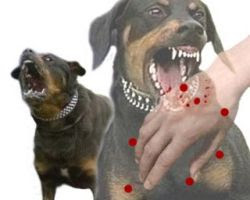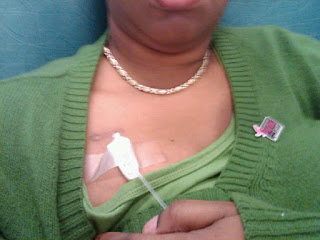HIV Virus (Human Immunodeficiency Virus) has yet to be treated, the sufferer is given only drugs amplifier body. People who are at risk of contracting HIV are if frequent unprotected sex with more than one partner or using illegal drugs by injection.
In the early stages of HIV infection, the most common symptoms were not there, said Michael Horberg, MD, director of HIV/AIDS at Kaiser Permanente, Oakland, California as quoted from the Health on Monday October 31, 2011.
Because there are no early symptoms, people sometimes do not know the risk that her body had entered the HIV virus. In 1 or 2 months of the HIV virus enters the body. By 40 to 90 percent of people experience flu-like symptoms can be known as acute retroviral syndrome (ARS). But sometimes the symptoms of HIV do not appear for several years and even decades after infection.
Here are some signs that maybe someone tested positive for HIV, among others:
1. Fever
One of the first signs of ARS is a mild fever, up to about 102 degrees F. Fever is often accompanied by other mild symptoms, like fatigue, swollen lymph nodes, and sore throat.
At this point the virus moves into the bloodstream and begin to replicate in large numbers. So there will be an inflammatory reaction by the immune system, said Carlos Malvestutto, MD, infectious disease and immunology instructor from the department of medicine at NYU School of Medicine, New York.
2. Fatigue
Inflammatory response produced by the immune system can also cause fatigue and lethargy. Fatigue can be a sign of early and advanced signs of HIV.
3. Stiff, sore muscles and joints, swollen lymph nodes
ARS symptoms often resemble the flu, mononucleosis, viral or other infections, even syphilis or hepatitis. It is indeed not surprising. Many symptoms are similar and even equal, including pain in the joints and muscle pain, and swollen lymph nodes.
Lymph nodes are part of the immune system and are likely to be inflamed when there is infection. Lymph nodes in neck armpit groin and others.
4. Sore throat and headache
As with other disease symptoms, sore throat, and headache can often be an ARS, said Dr. Horberg. If you have a high risk for HIV, the HIV test is a good idea. Because HIV is most infectious in the early stages.
5. Skin rash
Skin rash may occur early or late in the progression of HIV / AIDS.
6. Nausea, vomiting and diarrhea
About 30 to 60 percent of people with HIV have short-term symptoms such as nausea, vomiting, or diarrhea in the early stages of HIV, said Dr. Malvestutto. These symptoms can also arise as a result of antiretroviral therapy, usually as a result of opportunistic infections.
"Diarrhea is unrelenting and does not respond to drugs may be an indication. Or the symptoms may be caused by organisms not normally seen in people with good immune system," said Dr. Horberg.
7. Weight loss
"If people with HIV have lost weight, it means that the immune system generally is declining," said Dr. Malvestutto.
8. Hacking cough
Dry cough may be a first sign of a person exposed to HIV infection. The cough may last for 1 year and continues to get worse.
9. Pneumonia
Cough and weight loss may also be a sign of serious infections caused by bacteria that will not interfere if the immune system work properly. "There are many different opportunistic infections and each can come up with a different time," said Dr. Malvestutto.
Pneumonia is one of the opportunistic infections, while others, including toxoplasmosis, a parasitic infection that affects the brain, cytomegalovirus, and fungal infections in the oral cavity.
10. Night sweats
About half of people infected with HIV will be sweating at night during the early stages of HIV infection, said Dr. Malvestutto. Night sweats occur even when not doing any physical activity.
11. Changes in nails
Another sign of HIV infection is the final nail changes, such as splitting, thickening and nail the curving, or change in color (black or brown in the form of vertical and horizontal lines). Often it is caused by fungal infections, like candida.
Patients with a lowered immune system will be more susceptible to fungal infections, said Dr. Malvestutto.
12. Fungus Infection
Fungal infections are common in advanced stages is thrush, oral infections caused by Candida, which is a type of fungus. Candida is a fungus that is very common and one that causes yeast infections in women.
Candida tends to appear in the mouth or throat, so it will be difficult to swallow, said Dr. Malvestutto.
13. Confusion or difficulty concentrating
Cognitive problems may be a sign of HIV-associated dementia, which usually occurs late in the course of the disease. In addition to confusion and difficulty concentrating, AIDS-related dementia may also involve memory problems and behavioral problems such as anger or irritability.
It may even include changes such as motor, be careless, lack of coordination, and problems with tasks requiring fine motor skills like writing by hand.
14. Oral herpes and genital herpes
Cold sores oral herpes and genital herpes genital herpes can be a sign of ARS and the stage of HIV infection. Herpes can also be a risk factor for contracting HIV.
Because genital herpes can cause ulcers which facilitate HIV virus enters the body during sexual intercourse. People who are infected with HIV also tend to have higher risk of herpes because HIV weakens the immune system.
15. Numbness and weakness
Late HIV can also cause numbness and tingling in hands and feet. This is called peripheral neuropathy, which also occur in people with uncontrolled diabetes. "It shows damage to the nerves, said Dr. Malvestutto.
These symptoms can be treated with drugs that are sold painkillers and anticonvulsants such as gabapentin free.
16. Menstrual irregularities
Advanced HIV disease seems to increase the risk of menstrual irregularities, such as periods of fewer and less frequent. Such changes may have more to do with weight loss and poor health of women with late stage HIV infection.
HIV infection has also been associated with earlier age of menopause, which is about 47-48 years for HIV-infected women compared with uninfected women around the age of 49-51 years.















